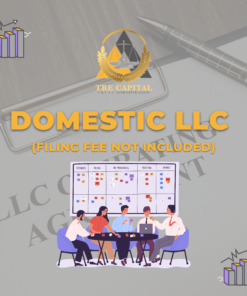THE HOLY TRINITY 3 LEG BUSINESS STRUCTURE
$1,750.00 Original price was: $1,750.00.$1,250.00Current price is: $1,250.00.
This Package includes:
1 Foreign Business Trust w/ Foreign EIN
1 New Mexico LLC w/ Foreign EIN (State filing fee included)
1 DBA
A foreign grantor business trust is a specific type of trust set up under non-U.S. law where the grantor (the person or entity who establishes the trust and transfers assets into it) is a non-U.S. person or entity. It functions much like any business trust but with the added complexity of dealing with international legal and tax issues.
In a typical trust arrangement, the grantor transfers assets to the trust, which is managed by a trustee for the benefit of the trust beneficiaries. The trustee has a fiduciary duty to manage the assets in the best interest of the beneficiaries.
In the case of a business trust, the trust is often set up to operate a business or invest in businesses, and the beneficiaries of the trust are generally the owners or investors in the business.
What is a EIN?
The Employer Identification Number, also known as the Federal
Employer Identification Number or the Federal Tax Identification Number,
is a unique nine-digit number assigned by the Internal Revenue Service
to business entities operating in the United States for the purposes of
identification.
What is a LLC?
A limited liability company (LLC) is a business structure in the U.S.
that protects its owners from personal responsibility for its debts or
liabilities. Limited liability
companies are hybrid entities that combine the characteristics of a
corporation with those of a partnership or sole proprietorship.
While the limited liability feature is similar to that of a corporation,
the availability of flow-through taxation to the members of an LLC is a
feature of a partnership rather than an LLC.
What is a DBA?
A Doing Business As (DBA), also known as a fictitious business name,
trade name, or an assumed name, is a name that the legal owners of a
business register with the state. Owners must register a DBA only if
they use a name—on
business signs, letterheads, advertisements, and so on—other than the
names of the legal owners of the business (for sole proprietors and
partnerships) or the name the owners listed on the formation paperwork
(for LLCs and corporations). For example, if Sherry Smith owns a flower
shop as a sole proprietor, she could use the name “Smith’s Flowers”
without registering. However, she would have to register the name
“Sunshine Flowers” if that’s the name she uses when doing business.
Be the first to review “THE HOLY TRINITY 3 LEG BUSINESS STRUCTURE” Cancel reply
Shipping Policy
https://app.termly.io/document/shipping-policy/20db7a2f-4869-4ff4-abfc-757e5b844999
Refund Policy
https://app.termly.io/document/return-policy/4e7319bb-6e18-4cd3-8c5b-edf5fb612d73
Cancellation / Return / Exchange Policy
https://app.termly.io/document/return-policy/4e7319bb-6e18-4cd3-8c5b-edf5fb612d73
General Inquiries
There are no inquiries yet.
Related products
Business
Business
Business
Business















Reviews
There are no reviews yet.